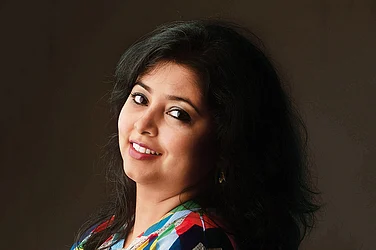What do you call a rural cooperative bank that offers a pension fund, a life insurance scheme, a business school to boot and just deals with women? Meet Chetna Gala Sinha — she calls it the Mann Deshi Mahila Sahakari Bank. Sinha, a portly woman in her fifties, is the founder of this women’s cooperative bank based out of Mahaswad village, Satara district.
Sinha, who spent her childhood in the bylanes of Null Bazaar in Mumbai, was exposed to rural life when she joined Sharad Joshi’s Shetkari Sanghatana in 1984. After marriage she shifted to Mhaswad and set up a farmer’s cooperative along with her husband. But it was Ela Bhatt, a friend and the founder of the Self Employed Women’s Association of India movement, who suggested that she start a women’s cooperative bank instead.
While Sinha was sold on the idea, setting up the bank was far from easy. After ninemonths of intensive talks, Sinha roped in 5,000 women to be 100% equity stakeholders in the bank with an initial share capital of #6 lakh. But she ran into a regulatory roadblock when the Reserve Bank of India rejected the banks proposal in November 1996, as banking laws did not permit illiterate women as promoters. Four months later, Sinha led a group of 35 women to Mumbai, where they met with the chief general manager of the Urban Banking Department of the RBI. They demonstrated their adeptness with numbers and convinced him to grant them a cooperative banking licence. In February 1997, the bank finally got its licence.
In the first week of operation not a single customer walked into the bank. After making some enquiries Sinha realised that women there didn’t have the time to visit her bank. “Then I realised that if the horse can’t come to the water, the water has to be taken to the horse. Thus we started the practice of door step banking through field agents.” The change was visible soon enough.
What’s on the menu
Today, Mann Deshi bank has over 165,000 clients, mainly milk and vegetable vendors, goat and sheep rearers, leather traders, and farm workers. Keeping in mind the unique requirements of its women customers, Mann Deshi has modelled four different loan schemes — short-term loans with maturity of one year for street vendors and small shop owners with 12% reducing rate of interest (RRI); medium-term loans with maturity of three to five years for SSIs at 14%; and long-term loans with maturity of 7-10 years for housing and housing related expenses with 14% RRI. It also provides one-year gold loans at 15% RRI. While loans below ₹15,000 require just two women as guarantors, anything above that requires collateral. “The bank has 97% repayment rate. Encouraging the habit of daily savings keeps the risk of default in check,” says Sinha. In the rare event of default the bank auctions the property of the defaulter.
Similarly, the bank has also customised its deposits. For street vendors, it offers the facility of daily savings. Women wage labourers receive weekly wages, so they are offered weekly savings.
The bank also offers a pension scheme to its clients in partnership with UTI Mutual Fund where clients save on a weekly, quarterly, monthly or annual basis. It offers a life insurance scheme in partnership with LIC and plans to introduce a micro insurance scheme and a health policy soon.
Today, as of date the bank has managed to spawn 100,000 successful women entrepreneurs.
While Sinha knew the bank had addressed the issue of credit, she believed that running a successful enterprise entailed providing the right guidance as well. With that thought, the bank set up an NGO, the Mann Deshi Foundation. Today, the NGO runs a business school and also a mentorship programme. Udyogini, the business school, helps women become successful entrepreneurs through vocational courses and training. Besides, there is guidance offered to scale up businesses through mock workshops. Under the Deshi Entrepreneurs programme, guidance and networking opportunities are given to those who need to expand their business. “We wanted to create 1,000 women entrepreneurs under the umbrella of these two programmes in seven years. But we achieved 700 within the first year itself. So, now the goal is to unleash more than a million women entrepreneurs by 2020,” says Sinha, with a sense of elation.
Cut to Vanita Pise, a former farmer turned plate maker. “Before my association with the bank I didn’t know how to market my products. Thanks to the training provided to me at the bank’s business school I was able to do so successfully,” she declares. Pise was awarded the National Women’s Exemplar award by prime minister Manmohan Singh in 2006.
The way ahead
Since its inception, Mann Deshi has come a long way. From a deposit base of ₹28 lakh in the first year, the bank has managed to grow the kitty at a healthy clip of 31% to₹ 40 crore. Currently, the bank has a loan book of ₹27.6 crore. But more importantly, it has managed to keep its net NPA at 2.29%. “This is because we have customised our loans to offer easier repayment schedules. Besides, we have field agents who collect savings daily from our clients that can be converted into loan repayment,” says Sinha. Going forward, the bank wants to set up branches in Pune, Hubli, Belgaum and Kolhapur. However, it faces two key challenges here. The first is getting staff. Sinha says that the bank will advertise for fresh talent. The second challenge is adequate capital. “For this purpose we have built a corpus from retained earnings,” she adds. “Every woman member of Mann Deshi bank exudes confidence, capability and capital,” concludes Sinha with a chuckle.

















